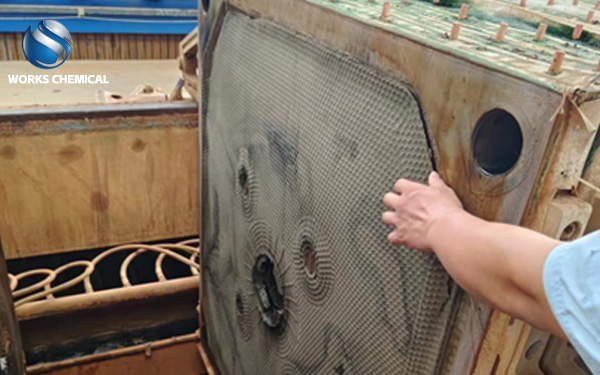
Sludge enhancer, as a chemical agent specially used to improve the dewatering performance of sludge, has shown potential to replace traditional agents such as polyacrylamide, ferric chloride and lime in sludge treatment. The following is a detailed analysis of the role of sludge synergists in sludge dewatering:

Advantages of sludge synergists
Damage colloidal structure of sludge:
Sludge synergists can effectively destroy the colloidal structure in the sludge, so that the sludge particles are easier to separate and dehydrate. This feature helps to reduce sludge viscosity and improve dehydration efficiency.
Increase sludge solid content:
After the use of sludge enhancer, the solid particles in the sludge are more likely to gather together, thereby increasing the solid content of the sludge and reducing the water content. This helps reduce the burden and cost of subsequent processing.
Simplified preprocessing steps:
Because sludge synergists can improve the colloidal structure and viscosity of the sludge, some tedious pretreatment steps (such as long stirring, adjusting pH value, etc.) can be simplified or omitted, thereby improving the treatment efficiency.
Reduce equipment maintenance costs:
Sludge enhancer can improve the fluidity of the sludge, reduce the wear and blockage of the sludge to the dewatering equipment, so the maintenance cost of the equipment can be reduced.
2. Comparison with traditional medicine
Comparison with polyacrylamide:
Although polyacrylamide can also improve the sludge dewatering efficiency, there may be problems such as corrosion of equipment and clogging of filter cloth. The sludge enhancer can avoid these problems more effectively and improve the work efficiency of the dewatering equipment.
Comparison with ferric chloride:
Ferric chloride as an inorganic coagulant, although it has the effect of coagulation and dehydration, excessive ferric chloride may lead to excessive coagulation and the formation of tight flocs that are difficult to dehydrate. Sludge enhancers can more precisely control the dewatering properties of the sludge and avoid excessive treatment.
Comparison with lime:
Lime is mainly used for conditioning sludge, increasing pH value and strengthening hydrolysis and flocculation of iron salt. But lime treatment method may produce a lot of waste residue, and the treatment period is long. Sludge enhancers can improve sludge dewatering performance more quickly without generating additional waste.
3. Practical application effect
Many wastewater treatment plants and industrial wastewater treatment facilities have successfully applied sludge enhancers. The practical application shows that the sludge enhancer can significantly improve the dewatering efficiency of sludge, shorten the dewatering time, and reduce the treatment cost. At the same time, the moisture content of the dehydrated sludge is reduced, and the volume is reduced, which is convenient for subsequent transportation, storage and disposal.
Conclusion
In summary, sludge enhancers have shown potential to replace traditional agents in sludge dewatering. Reasonable selection and use of sludge enhancers can bring significant economic and environmental benefits to sewage treatment plants and industrial wastewater treatment facilities. However, it should be noted that the performance and scope of application of different sludge synergists may be different, so it is necessary to select and optimize according to the nature and treatment requirements of the sludge in practical applications.